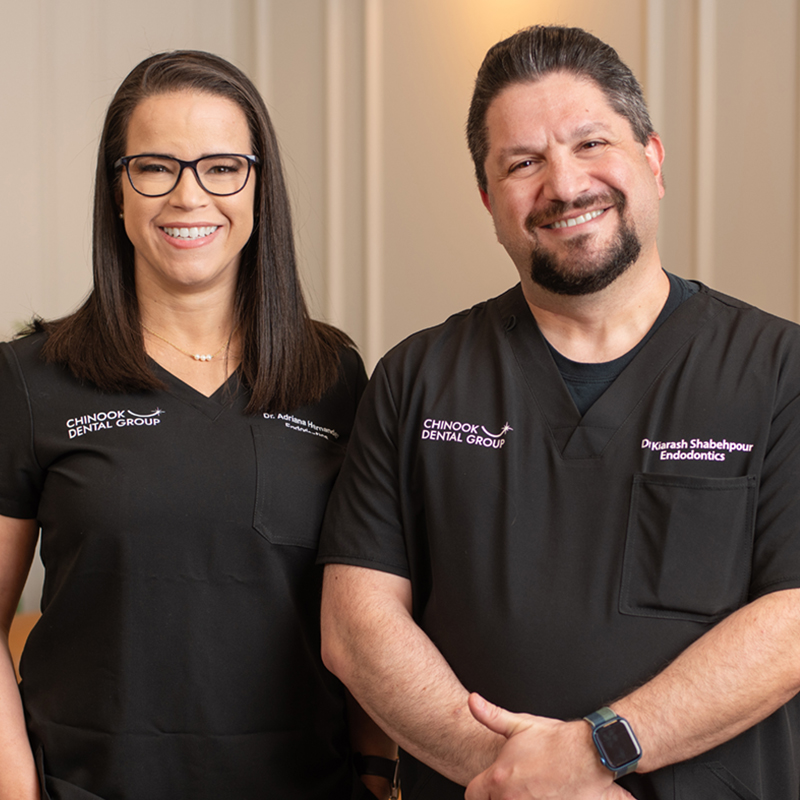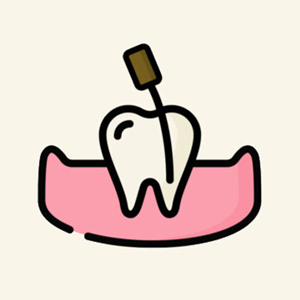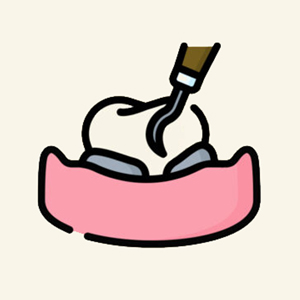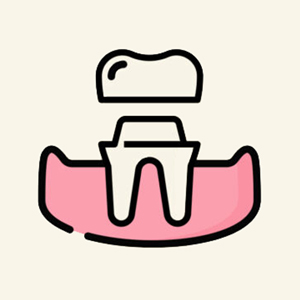Why Choose Chinook Dental Group?
Three Dental Specialties
Receive comprehensive care for three dental specialties.
Appointments Available
Receive timely care and schedule immediate appointments.
No Judgement Services
Receive dental care without feeling embarrassed or uncomfortable.
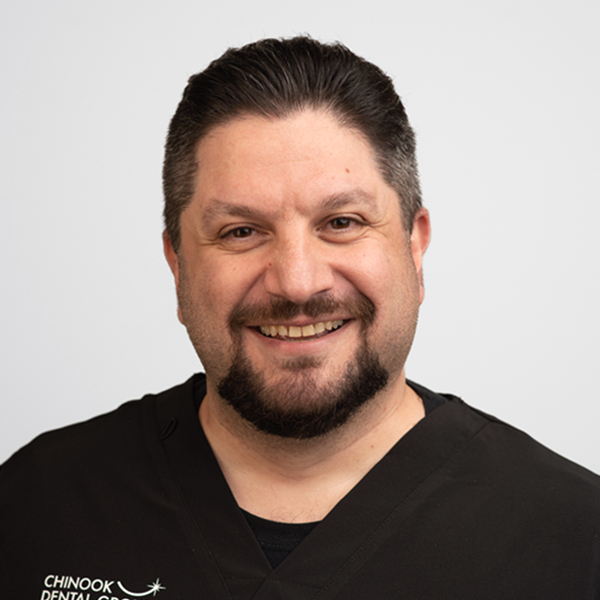
Dr. Kiarash Shabehpour
Dr. Kiarash Shabehpour (or Dr. Kia as his patients and colleagues tend to call him) is a Certified Specialist in Endodontics. He finished his specialist training at the University of British Columbia, where he is currently a clinical instructor helping with training of the next generation of Endodontists.
Dr. Shabehpour practices in both Alberta and British Columbia and along with his team, helps his patients and colleagues with root canal related procedures on a referral basis. He is fluent in both English and Farsi.
When not working, he loves spending time with his family, indulges in martial arts of Judo or can be found on the slopes, skiing.
Dr. Shabehpour is proud supporter of animal rescue groups worldwide.
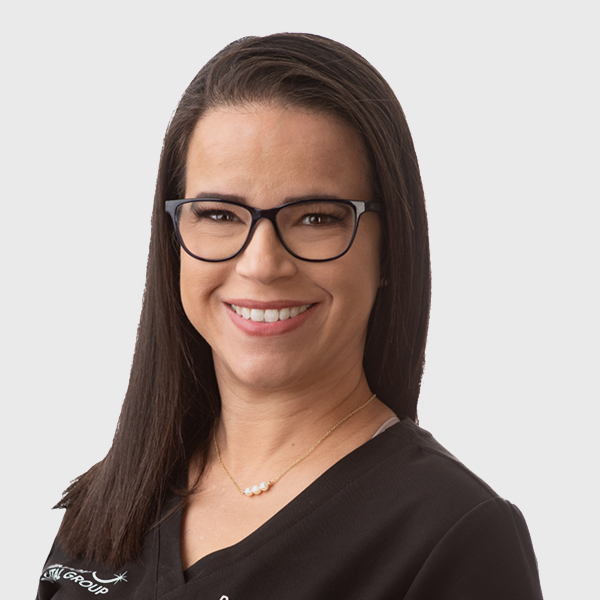
Dr. Adriana Hernandez
Dr. Adriana Hernandez obtained her BDS degree in Venezuela in 2005. Following several years of successful practice as a general dentist, she decided to further her expertise by specializing in Endodontics. Her journey as a specialist in Endodontics allowed her to serve the dental community in Venezuela with high skill and dedication for several years.
Later on, Dr. Hernandez, along with her husband and three children, relocated to Canada. In Canada, she pursued additional dental education at the University of British Columbia, where she earned certification for her specialty degree. Today, Dr. Hernandez primarily assists patients and colleagues with root canal treatments and endodontic surgeries on a referral basis. She is fluent in English and Spanish.
Cracked Tooth Dentist Calgary
A cracked tooth, also sometimes called a fractured tooth or cracked tooth syndrome, happens when a crack appears on your tooth. It may vary in size, with some being so small that they may not even require treatment.
However, a major crack on the tooth may cause it to break or split. So, urgent dental care is required to prevent further damage and possibly losing your tooth.
If you suspect that you have a cracked or fractured tooth, see your dentist right away so they can assess and determine the best treatment for you.
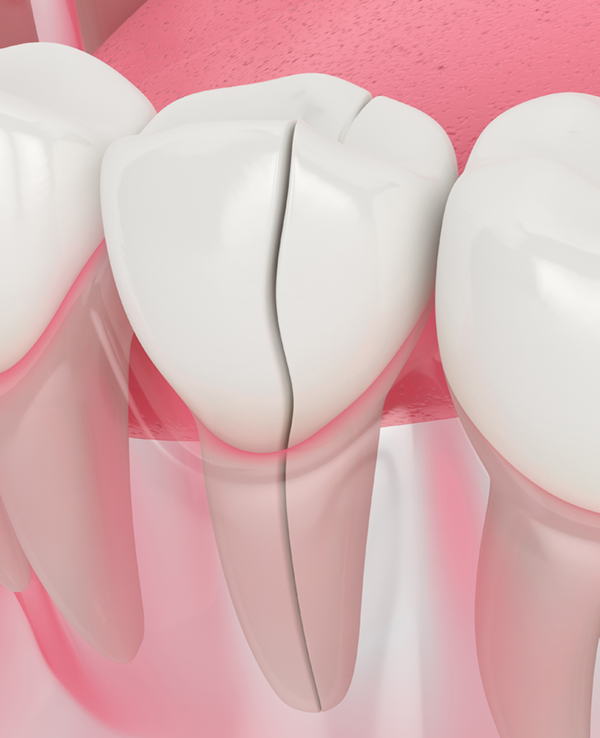
Causes of Cracked Teeth
The most common causes of cracked teeth are:
-
- Aging causes normal wear and tear on the tooth which makes the tooth more vulnerable to cracks
- Hard or chewy foods such as candies and caramels
- Poor oral habits such as chewing on ice increase your risk of cracked teeth
- Large tooth decay or fillings that weaken the tooth
- Teeth grinding causing consistent pressure on the tooth can cause fracture
- Root canal treatment which makes the tooth more brittle and prone to breakage
- Trauma such as falls, sports injuries, accidents
- Sudden changes in mouth temperature
Generally, patients 50 years old or older are more prone to cracked teeth. This is mostly because of weaker teeth caused by normal wear and tear.
Also, the front teeth and lower molars are most often affected. This is likely due to trauma or accidentally biting on something too hard.

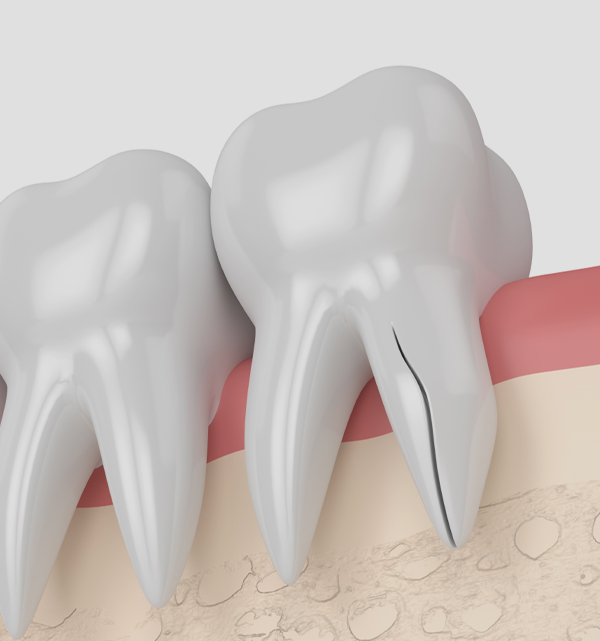
Types of Cracked Teeth
The type of cracked teeth depends on which area of the tooth is involved.
- Craze lines – are superficial, hairline or super small cracks on the tooth that involve only the tooth enamel. This is the outermost layer of the tooth. Craze lines are painless and may not need treatment.
- Cracked tooth – this occurs if a vertical crack occurs on the tooth to the gum line. If the crack is above the gum line, your dentist may be able to save your tooth with root canal therapy. However, if it extends beyond the gums, extraction may be recommended. A cracked tooth requires immediate diagnosis and treatment to avoid losing your tooth.
- Fractured cusp – biting on something hard or chewy can fracture the tooth. Small tooth fractures can be repaired with fillings. But if the fracture goes beyond the tooth pulp, root canal treatment is required to remove infected tooth parts and save your tooth.
- Split tooth – this crack splits the tooth into two. Depending on the severity of the crack, your dentist may be able to preserve half of the tooth with root canal therapy and a crown.
- Vertical root fracture – this type of crack begins at the root up to the tooth crown. This tooth crack has the worst long-term prognosis, so extraction is considered the most common treatment.
Recognizing Symptoms of Cracked Teeth
Not all cracked teeth can show symptoms, especially for craze lines. But when they do show symptoms, they may include:
- Pain, especially with the release of biting and chewing pressure
- Sensitivity to temperature changes in the mouth
- Gum swelling
Diagnosis of Cracked Teeth
There are several ways in which your dentist can diagnose a fractured tooth. First, your dentist will ask about your symptoms and related dental history such as a previous trauma or injury and habits such as teeth grinding.
After that, your dentist will do a thorough dental examination and will:
- Inspect your tooth for superficial crack lines
- Tap on the tooth using the end of a mouth mirror
- Ask you to bite on a stick to assess for pain upon bite release
- Examine for gum inflammation around the tooth
- Pass a light through the tooth to check where the crack or fracture is (transillumination)
- Put a staining dye on the tooth to better see the crack
- Take X-rays or other imaging technology (CBCT) to identify bone loss related to a possible tooth fracture
With proper assessment, your dentist can create a customized treatment plan to restore and save the tooth and prevent future problems.
Treatment Options for Cracked Teeth
The treatment for a cracked tooth depends on the severity of the damage. Some options include:
- Dental bonding – plastic or composite resin is used to repair the fracture.
- Cosmetic contouring – a polishing disk smoothens and rounds off sharp edges from a small chip on the tooth.
- Tooth crown – a large tooth fracture needs extra strength and support with a tooth crown made from metal-porcelain, all-porcelain, or zirconia.
- Veneer – an ultra-thin layer of composite resin or porcelain goes over the front of the tooth to cover minor imperfections such as small tooth cracks.
- Root canal treatment – tooth cracks that have reached the pulp or the gumline need a root canal to remove infected pulp tissue and restore the health of the tooth. Afterwards, a crown is recommended to restore the structure and appearance of the tooth.
- Tooth extraction – if all else fails, removing the tooth may be a better option to prevent damaging other teeth and worsening complications. Then, your dentist will discuss tooth replacement options, such as a dental bridge or implant.
Complications and Consequences of Untreated Cracked Teeth
While smaller tooth cracks can get away without being treated, a relatively larger or deeper crack on the tooth will require treatment. Early diagnosis and treatment are important to prevent complications such as:
- Severe, continuous pain
- Difficulty in eating, chewing, or drinking
- Infection (tooth abscess) causing fever and swollen lymph
- Tooth loss
Getting advice for cracked tooth syndrome as soon as possible is important to prevent further complications and help the treatment be more effective.
Preventive Measures to Reduce the Risk of Cracked Teeth
You can’t prevent every tooth fracture. It may happen accidentally and is quite common, especially when you age. But you can reduce the risk of cracked tooth syndrome with the following tips:
- Avoid chewing hard, crunchy, or chewy foods such as hard candy and ice.
- Practice good oral hygiene.
- Wear habit breakers such as a mouthguard for teeth-grinding.
- Participate in meditation classes to prevent teeth clenching due to stress

